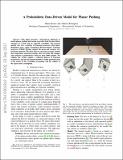A probabilistic data-driven model for planar pushing
Author(s)
Bauza Villalonga, Maria; Rodriguez Garcia, Alberto
Download1704.03033.pdf (4.757Mb)
OPEN_ACCESS_POLICY
Open Access Policy
Creative Commons Attribution-Noncommercial-Share Alike
Terms of use
Metadata
Show full item recordAbstract
This paper presents a data-driven approach to model planar pushing interaction to predict both the most likely outcome of a push and its expected variability. The learned models rely on a variation of Gaussian processes with input-dependent noise called Variational Heteroscedastic Gaussian processes (VHGP) [1] that capture the mean and variance of a stochastic function. We show that we can learn accurate models that outperform analytical models after less than 100 samples and saturate in performance with less than 1000 samples. We validate the results against a collected dataset of repeated trajectories, and use the learned models to study questions such as the nature of the variability in pushing, and the validity of the quasi-static assumption.
Date issued
2017-05Department
Massachusetts Institute of Technology. Department of Mechanical EngineeringJournal
2017 IEEE International Conference on Robotics and Automation (ICRA)
Publisher
Institute of Electrical and Electronics Engineers (IEEE)
Citation
Bauza, Maria, and Alberto Rodriguez. “A Probabilistic Data-Driven Model for Planar Pushing.” 2017 IEEE International Conference on Robotics and Automation (ICRA), 29 May - 3 June, 2017, Singapore, Singapore, IEEE, 2017 .
Version: Author's final manuscript
ISBN
978-1-5090-4633-1